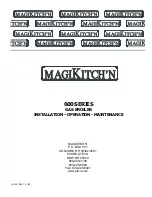
P-K SOLIS™
Gas Fired Boiler
Technical Service 1.877.728.5351
Revised: March 15, 2021
Released: March 15, 2021
Patterson-Kelley 2021
All Rights Reserved.
2701000090 P-K SOLIS NURO Installation and
Owners Manual (Rev A).docx
Page 41
3.7 Piping
Gas Piping Overview
Before making the gas hook-up, make sure the boiler is being supplied
with the type of fuel shown on
the boiler nameplate.
The boiler shall be installed such that the gas
ignition system components are protected from
water (dripping, spraying, rain, etc.) during
appliance operation and service (circulator
replacement, control adjustment, etc.).
The boiler is factory fire-tested and adjusted for proper
combustion. The gas train components are certified to
handle a maximum inlet pressure of
14" W.C. (1/2 psig).
Typical gas pressure supply for natural gas is 7" W.C. If
the available gas pressure exceeds 14" W.C., a suitable
additional intermediate gas pressure regulator of the
"lock up" type must be provided to reduce the pressure
to less than 14" W.C. Refer to the table below or the
appliance’s label for the minimum inlet gas pressure.
SL-1500
SL-2000
SL-2500
SL-3000
Natural Gas
3.5” W.C
Install a sediment trap (drip leg) and a union connection ahead of the primary manual shutoff valve on
the boiler. A gas piping schematic is shown above. Gas piping should be installed in accordance with
National Fuel Gas Code, ANSI Z223.1, latest edition, and any other local codes which may apply; in
Canada see CAN/CSA-B.149.1, latest edition. In the Commonwealth of Massachusetts, the gas cock
must be a “T-handle type.”
Appliance Size (BTU/Hr)
Natural Gas Requirement
(CFH)
1,500,000
1500
2,000,000
2000
2,500,000
2500
3,000,000
3000
Simplified Gas Piping
Note:
When using a vented lock-up gas pressure regulator, the vent piping should be increased by
one pipe size for every 10 equivalent feet of length. Never connect vent piping that is small in size
than the gas regulator’s vent port connection.
















































